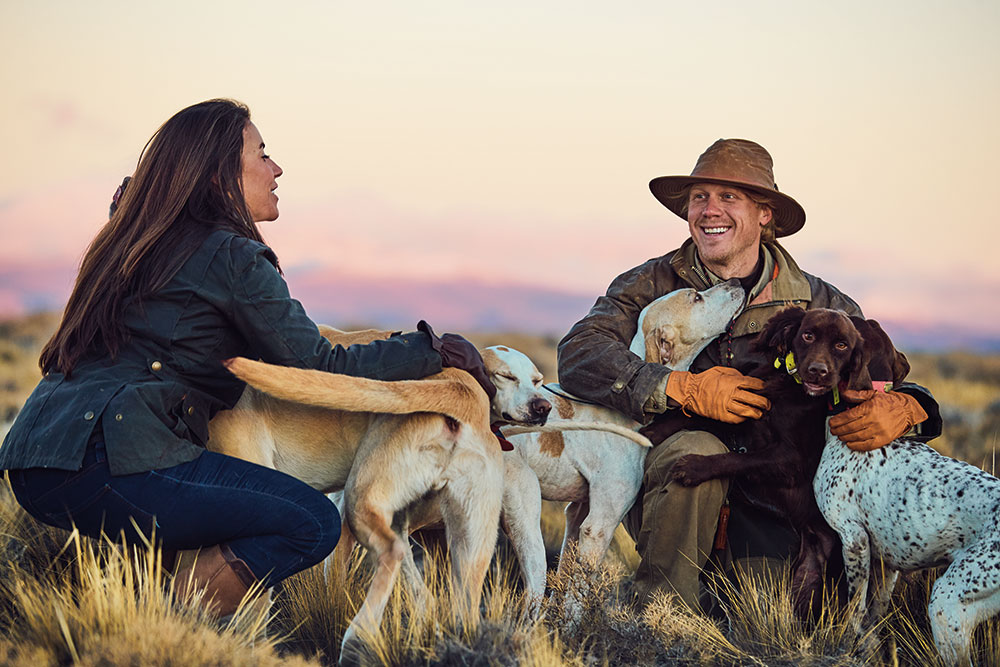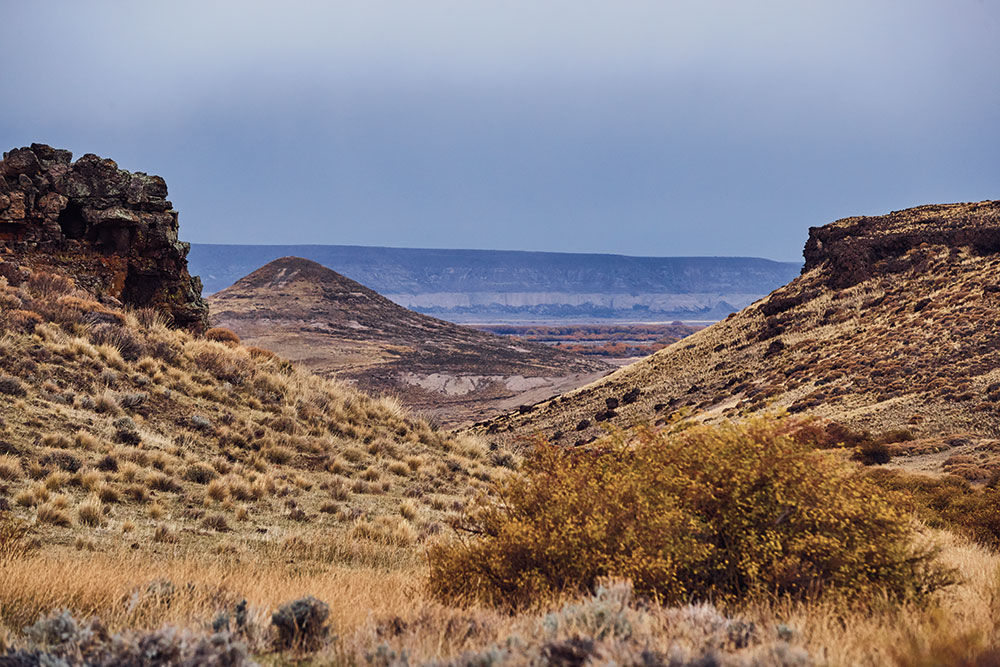Paradise Found

After our travel from the United States to South America, we arrived at our lodge on the eastern slope of the Andes Mountains in Patagonia. During the last leg of the journey, the blacktop road out of San Martin de los Andes, Argentina, lasted about five minutes before converting into a packed-dirt surface for the next hour and a half. Until we reached the lodge, not a single trace of human existence was visible in any direction of the Patagonian steppe…not a building…not another vehicle…not a road sign…nothing. Even the clear blue heavens were devoid of visible aircraft or their contrails crossing the sky. These sights, or the lack thereof, elicited eerie and intriguing feelings about this place and created the false impression that we’d completely left the planet. When our lodge finally came into view, it materialized on the horizon like a distant mirage.
On the following morning, we awoke in time to watch the sun crest the mountains. A brilliant palette of colors—blues, reds, yellows, and oranges—spilled onto the horizon through the clouds of an overcast sky. Will and Lauren Cowan paused from their work for a moment to watch the dawning of another day. Moments such as these fuel their passions and reaffirm their decision to earn their living in the foothills of the Andes. But before this husband-and-wife team chose to make a home in this majestic place, they were steeped in the traditions of Southern sporting life, which kindled their desire to explore the natural world and live their values in places barely touched by man.
Growing up in Memphis, Tennessee, Will had quick access to some of the best waterfowl hunting in the States. Among the swampy tributaries of the Mississippi River Delta, his father and grandfather shared their knowledge and inspired his insatiable appetite for adventure. “After finishing college, I knew I’d never be able to sit behind a desk all day,” he jokingly admitted. From the time Lauren was old enough to navigate her way through the switchgrass reeds, she accompanied her father afield on their South Alabama quail plantation. There she learned the traditions of Southeastern quail hunting, and though she relocated to the urban environs of Nashville, neither the infectious enthusiasm of a gun-dog brace, nor the spectacular explosion of a covey rise was ever far from her mind.

In 2008, after selling most of his worldly possessions, Will relocated to South America and guided hunts for a premier outfitter out of Buenos Aires. While he was home visiting family, a mutual friend of Lauren and Will suggested they meet after recognizing their shared interests and experiences. “Both Lauren and I have an adventurous spirit, and we didn’t know exactly what we wanted to do. We knew that we didn’t want to live in the rat race,” said Will. Lauren added, “While we were dating, Will and I asked each other what we wanted out of life, and in so many words, both of our answers were ‘to make a difference,’ and that was something that connected us.” Will and Lauren were married in 2013, and both of them felt compelled to live unfettered in remote areas where they could share their passion for the sporting life with others.
Their search for authentic, fair-chase opportunities led them to start HookFire Adventure Travel and Safaris. Will was a hospitality and business major with plenty of experience guiding clients, while Lauren brought a logistical mind and a way of connecting with people that stemmed from her graduate work in psychology, in addition to her experience afield on the quail plantation. “We took a leap of faith when we started HookFire, and though it was rough at first, we held true to our vision. I couldn’t have built it without her,” Will said. They lived frugally while traveling back and forth between the United States and South America with their clients. After years of hard work and dedication, they grew profitable enough to expand their operations all over the world and make a permanent home in Argentina. “We had an itch to move outside of the United States, and Argentina was a natural fit for us. There are places down here where we take people quail hunting that’ve rarely, if ever, been seen by a human. There aren’t many places in the world like that anymore,” Lauren said.
At first glance, this dry and arid region greatly resembled parts of Montana and Wyoming. But the absence of sagebrush, and its distinct fragrance, reminded one of how far we were from familiar ground. After driving just a few miles down a dusty road toward a mountain in the distance, the flat steppe descended into a valley where rolling hills with spring-fed streams teemed with wild game. “You’ll feel like you’re on the moon one second, and then the next you’ll be in a stand of lush grass,” said Will. Lauren added, “Parts of it honestly look and feel like places we’ve been to in Africa.”

A single ranch in Patagonia is typically comprised of tens of thousands—or even hundreds of thousands—of acres, and on any given ranch, multiple microclimates and ecosystems can coexist. Will and Lauren draw limitless energy and inspiration from such raw and isolated beauty. “Patagonia is the kind of place that brings you down to earth. It’s one of the most beautiful spots on this planet, and it reminds you of what’s important in life,” said Lauren. Will quickly added, “In these valleys, there are rivers no human has ever fished, and quail that’ve never heard a shotgun. This is one of the most genuine places you’ll ever see. I’ve seen a dreamy look in people’s eyes when they talk about places like this.”
Getting this deep into South America can be tricky. Will and Lauren, along with the staff of HookFire, offer as much, or as little, assistance in arranging for travel, lodging, and meals as each client prefers. “We’re both very hands-on every step of the way. Anyone who hasn’t done this before needs to feel comfortable. And because our company is owned and operated by Americans—and because we live here—we understand how to best meet the needs and expectations of people from the United States and Europe,” Lauren explained. With few local sportsmen, optimal climate conditions, and very little habitat lost to development, wingshooting and fishing opportunities in the Patagonian Andes are unparalleled.
Surprisingly, some of the game species, such as quail, red stag, and trout, aren’t native to the region. One species in particular, the California quail, has done remarkably well, with greater populations found in Southern South America than their native habitat of Western North America. California quail were introduced to Patagonia in the 20th Century, and since then, they have spread all over Argentina and other Southern areas of the continent with coveys numbering in the hundreds. “Lauren got me into quail hunting on a more serious level, and how could you resist it with the numbers we have down here. If I was down to the last $1,500 in my bank account, I’d wager every dime of it that you couldn’t find an avid quail hunter among the native population,” Will smirked.

Will and Lauren showed us firsthand the unbelievable numbers of quail living in the valleys of this particular ranch. We loaded into a pickup truck to efficiently cover this enormous swath of ground and to keep up with the dogs. After driving to an area with a high probability of full coveys to successfully flush, Will stopped the truck and released his pack of English pointers and German shorthaired pointers into a grassy savanna before getting back behind the wheel. The dogs ran deeper into the valley, and when they slammed on point, we quickly dismounted, loaded our double guns, and fanned out in a long line as Lauren kept their flushing dogs at heel. “Are y’all ready,” Will asked. When everyone signaled in the affirmative, Lauren sent their English cocker into a briar patch, and the largest covey of quail we’d ever seen exploded from the ground. They swarmed around us like an Old Testament plague, flying low, fast, and erratic in all directions. Though we’d signaled to Will and Lauren that we were ready, nothing prepared us for such a spectacle. Quail numbering in, or near, the hundreds erupted from the ground.
We pushed forward, on foot, deeper into the valley. Temperatures fluctuate between pleasant and polar in the steppes—cold, dry air filled our lungs and beads of sweat accumulated on our brows as we followed the pointers bounding through the brambles and grass. Will and Lauren steered our party in a direction where they could use the terrain to pin quail before the rise. As birds took flight, our hearts seemed to flutter in concert with their beating wings, creating the feeling that we might also defy gravity and take flight with them across the valley. As the strangely aromatic smoke from spent cartridges wafted from the breeches of our barrels, we decided to search for other coveys the rest of the day.
During the ride back to the lodge, Will and Lauren talked about the cultural nuances of their experience since moving permanently to Argentina, as well as the positive effects their business has on the local economy. “Argentine culture is very warm and welcoming—similar to the South where we grew up. Things move at a much slower pace here, and it’s teaching us to take time to be with people and slow down, which is what I feel like the South used to be,” Lauren said. HookFire employs local people from across the region, resulting in a positive impact on the economy and the natural resources. “There’s the kitchen staff, the groundskeepers, the hunting and fishing guides, managers, and chefs—we definitely offer a benefit to the economy and the natural habitat of this place. People that book with us should feel very good about that,” said Lauren. Argentina’s overall economy relies heavily upon adventure tourism, which keeps the government dedicated to maintaining this pristine habitat and the locals personally invested in the success of the industry.

When evening approached, we paused for a moment in the vesper light to observe the sun setting beyond the mountains as an enormous yellow moon peeked out from behind a bank of color-cast clouds. Both these celestial bodies simultaneously occupied opposite ends of the horizon, vying for supremacy over the night sky. At a time when people place such a high priority on connectivity to one another, it seems possible that humans have never been more disconnected from themselves and from the powerful beauty of the natural world. But it’s still out there in some places—ready and waiting to shape the content of an individual’s character. “Will and I love having a positive impact on people, and they’re so willing to put themselves out there and be vulnerable while they’re here. And we don’t do it on purpose—it just happens!” Lauren exclaimed. Will agrees, “There’s not anybody in this wilderness but us, and once people realize that, they really start to open up. It’s like there’s something in the soil.”
As it becomes increasingly difficult to find authentic places to truly reconnect with nature through the sporting life, services such as HookFire, and its owners Will and Lauren Cowan, are a welcomed lifeline. For the rest of my days, that mirage on the distant horizon will never be far from my mind.
Originally published in Volume 8, Number 1 (December-January 2020) of Covey Rise.
























